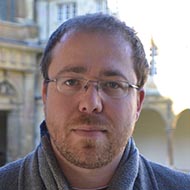Joe Moshenska
Beaverbrook and Bouverie Tutorial Fellow in English; Professor of English and Comparative Literature

Teaching
I arrived at Univ in April 2018 after teaching in Cambridge for eight years. I teach Paper 3 (1550-1660) and Paper 4 (1660-1760) as well as Shakespeare. One of the things that I enjoy most about teaching this period of literary history is that I get the chance to work with students on some major canonical authors – Edmund Spenser, John Donne, Ben Jonson, Lucy Hutchinson, John Milton, Aphra Behn, Alexander Pope – while helping them to find ways of making the writing from this period their own. This can mean both finding idiosyncratic routes into the work of these major figures that excite them, and making their way into lesser known corners of the period: I’ve enjoyed working with students on early modern diaries and cookbooks, for example, and on the extraordinary writings of seventeenth century religious radicals like Abiezer Coppe and Jane Lead. I try to show students that careful scrutiny of textual details, tactful deployment of historical knowledge, and ambitious theoretical or philosophical scope are all equally necessary and interrelated parts of approaching literature.
My faculty teaching in 2018-19 will include sessions on Early Modern Race and John Milton’s pastoral poetry. I am co-teaching a new Paper 6 option for third year students called “Border Crossings, 1350-1688”, which will look at the ways in which national, religious, racial and other kinds of border were crossed, entrenched and negotiated in medieval and early modern works, from Mandeville and Thomas More to Milton and Behn.
I like to supplement my tutorials and classes with excursions beyond the classroom, including visits to college libraries and the Bodleian Special Collections and Map Room. I am also planning with a colleague to take Univ students on a walk around Oxford, introducing them to some of the places in which the ‘Scientific Revolution’ of the Seventeenth Century took shape.
Research
My research is mostly located in the period between 1500 and 1700, although I am also interested in later philosophical writings of various sorts. My second book, published in 2019, is titled Iconoclasm as Child’s Play, and looks at a remarkable moment in the sixteenth century when holy things taken from churches during the Reformation were, instead of being smashed or burned, given to children as toys. I’m using this practice to think about the relationship between play, religion, art and violence, in the early modern period and our own.
I’m also interested in finding ways to communicate my excitement about the sixteenth and seventeenth century to a wider audience. My book A Stain in the Blood, on the seventeenth century polymath Sir Kenelm Digby, was written for the general reader. I quite often discuss early modern topics on Radio 3, and in 2017 I presented a documentary on Milton’s Paradise Lost that was broadcast on Radio 4.
Selected Publications
Books
Iconoclasm as Child’s Play. Stanford University Press, 2019
A Stain in the Blood: The Remarkable Voyage of Sir Kenelm Digby. William Heinemann, 2016
Feeling Pleasures: The Sense of Touch in Renaissance England. Oxford University Press, 2014
Selected Articles
‘Spenser at Play,’ PMLA, January 2018.
‘Double Conversion: The Sensory Autobiography of Sir Kenelm Digby,’ in Sensing the Sacred, ed. Elizabeth Swann et al (Routledge, 2018).
‘Screaming Bleeding Trees: Textual Wounding and the Epic Tradition,’ in Blood Matters, ed. Bonnie Lander Johnson & Eleanor Decamp (University of Pennsylvania Press, 2018).
‘Sir Kenelm Digby’s Interruptions: Piracy and Lived Romance in the 1620s,’ Studies in Philology 113 (2016).
Why Can’t Spenserians Stop Talking About Hegel? A Response to Gordon Teskey,’ Spenser Review 44.1.2 (Spring-Summer 2014).
‘The Forgotten Youth of Allegory: Figures of Old Age in The Faerie Queene,’ Modern Philology 110.3 (February 2013).